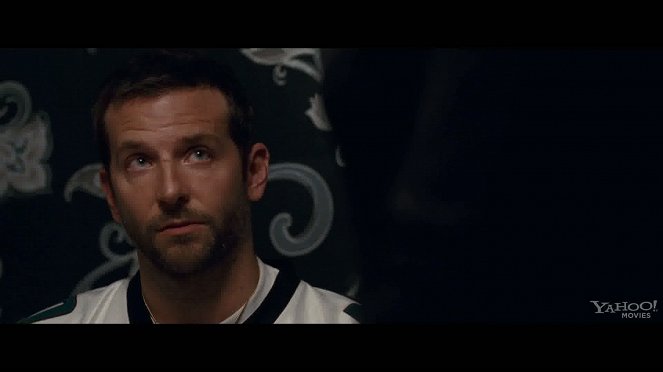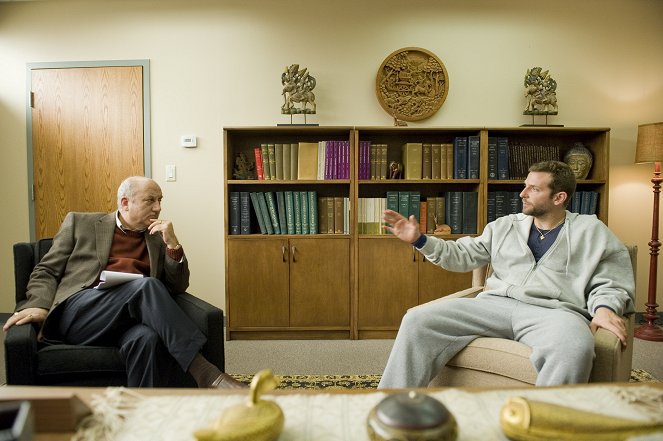Directed by:
David O. RussellScreenplay:
David O. RussellCinematography:
Masanobu TakayanagiComposer:
Danny ElfmanCast:
Bradley Cooper, Jennifer Lawrence, Robert De Niro, Jacki Weaver, Chris Tucker, Anupam Kher, John Ortiz, Shea Whigham, Julia Stiles, Paul Herman, Dash Mihok (more)Plots(1)
Life doesn’t always go according to plan… Pat Solatano (Bradley Cooper) has lost everything - his house, his job, and his wife. He now finds himself living back with his mother (Jacki Weaver) and father (Robert De Niro) after spending eight months in a state institution on a plea bargain. Pat is determined to rebuild his life, remain positive and reunite with his wife, despite the challenging circumstances of their separation. All Pat’s parents want is for him to get back on his feet - and to share their family’s obsession with the Philadelphia Eagles football team. When Pat meets Tiffany (Jennifer Lawrence), a mysterious girl with problems of her own, things get complicated. Tiffany offers to help Pat reconnect with his wife, but only if he'll do something very important for her in return. As their deal plays out, an unexpected bond begins to form between them, and silver linings appear in both of their lives. (Roadshow Entertainment)
(more)Videos (29)
Reviews (11)
For some, Silver Linings Playbook will be a barking drama where characters merely argue, shoot diagnoses at each other, and search for happiness through priorities that are not entirely understandable. For me, Playbook is a confession, an awakening, the power of life, and a shouted desire for happiness. If I were so bold as to say that at the end of the movie, I was feeling that no matter what happens, I've got a chance to prove what is most important to me in life, it would sound like the most worn-out cliché. But it was Pat and Tiffany who got me into this sincere mood – from the first monologue to the captivating ending.
()
Who is crazy? And who is normal? I rather feel that the crazy person is in all of us, the question is, what, who and how activates it. In this movie Jennifer Lawrence and Bradley Cooper activated it before the story began and I see only the therapy. I have to say, it was really nice to watch. Especially Jennifer Lawrence and especially when she was twisting during the dancing. Nevertheless, I really have to admit that I haven’t seen such unique romantic movie in a really long time. Properly crazy, honestly funny and realistic in the way only life can be.
()
An excellent actors’ film. The Oscar hype may be exaggerated in this case, and the story offers no memorable authorial ideas, but it's a heavy-handed feel-good film with beautifully drawn characters that, for me, represents one of the most honest depictions of an ordinary American family in recent years. Where authenticity commits suicide, it's fully supported by the palpable chemistry between Bradley and the divine Jennifer, which (the chemistry) had me glued to my seat, and who (Jennifer) stirred my remaining teenage hormones and left no doubt that she was more deserving of an Oscar than any actress not named Meryl Streep. It’s a pure caricature, as is usual with O. Russel, but it’s funny and, judging by the enthusiastic reception, obviously good.
()
Based on the responses from abroad, Silver Linings Playbook looked like one of the most attractive of this year’s Oscar contenders, unfortunately though, I wasn’t really sold on it. The messy web of relationships of a bunch of weird, crazy and neurotic characters, lead by Jennifer Lawrence and Bradley Cooper (both of whom I consider very talented young actors), didn’t win my heart. If I look at it positively, it’s still some nice brisk fun, but nothing more than that. Emotionally, the film missed me by a wide margin, to the point that I’m not even sure when I was supposed to feel any emotions, because the relationship between the main characters happens as if by the way, especially on the part of Cooper. They meet, they argue, they dance and boom. Chris Tucker is insufferable. 7/10
()
The protagonists of screwball comedies acted crazy. The protagonists of Silver Linings Playbook are crazy. Of course, within the boundaries of American indie romances, i.e. they are characters with eccentric behaviour and minimal psychological depth, and they are defined only by their interactions with their immediate surroundings. He loses his nerve here and there, she has nymphomaniacal tendencies, and both of them have lost someone. Now they need to emotionally fill up the vacant space and find their lost balance (for example, in dancing). It’s not necessary to know more than that to understand the story and to get a good feeling in the end. Russell placed his bets on good actors and sharp verbal exchanges, so it’s not surprising that the film’s highlights include the scene in which several mentally unstable characters shout at each other in front of a shaky camera. However, this is just another display of “shaky cam” syndrome. The nervous camerawork is used in line with Pat’s gradually subsiding uneasiness. The scenes with the psychiatrist are calmer and the camera movements gain a certain harmony with the gradual coming together of the central couple, which, however, has long been motivated by selfishness, so a certain nervousness and uncertainty persist. In other scenes, the camera points out what the characters realise only later (the reading of the letter), thus creating tension and raising expectations, which at least make the path to the predictable ending more enjoyable. It’s pleasing that, unlike many contemporary comedies, the film isn’t made up only of scenes and one-liners and that it also has a carefully thought-out structure (a vaulted dramatic arc, if you like), without dead spots and with a climax in which all of the motifs are conscientiously put to good use. The fact that the protagonist doesn’t have his behaviour fully under control and that he has to learn how to dance because of his “treatment” does not in any way weaken the thoroughly androcentric narrative (we barely get to know Tiffany’s parents; Pat’s parents condition the denouement), and in other respects the screenplay is revisionist only in relation to screwball comedies. Social norms are undermined by the transfer of the treatment process from the institutional context to the outside world, or rather the denial of the dichotomy between “normality” and “madness”. Unlike with classic screwball comedies, the realistic context here (treatment facility, pills, aggression) make us aware that the characters behave differently than is customary in their world. However, neither one of them has to enter a more normal world. In other words, everyone is crazy; it’s just a matter of finding the right one. 75%
()



Ads